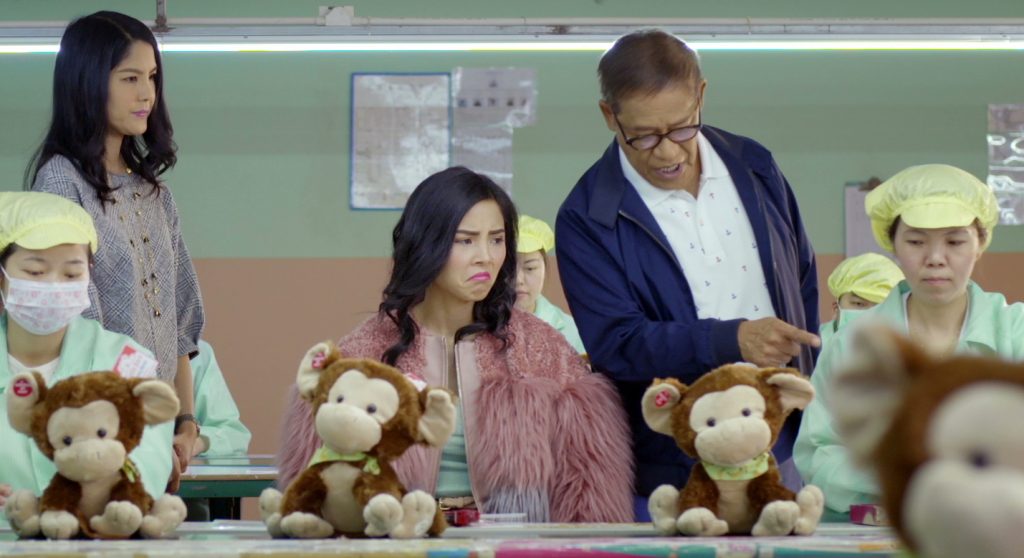
Lynn Chen, Anna Akana and Richard Ng on the toy factory floor in “Go Back to China”
The boldly titled “Go Back to China,” which opened in theaters on March 6, is the second feature by writer and director Emily Ting. The comedic story, about a spoiled Los Angeles party girl who is forced back to Shenzhen to work at her father’s toy factory after he cuts off her funds, was inspired by Ting’s experience, and touches on a number of serious issues as well, from the impacts of infidelity and an absentee parent on young children to labor conditions and the hardships faced by migrant workers. Ahead of the film’s release in theaters and on-demand, CFI caught up with Ting to discuss its journey to the screen and her work as a filmmaker seeking greater representation for Asian-American stories.
China Film Insider: You first told this story in a documentary format, why did you decide to retell it in fictionalized form?
Emily Ting: The documentary I made in 2007 was called “Family Inc.” At the time I was two years into my journey of going back to China and working for the family business, so my perspective then was very different than it is now over a decade later. That film came very much from a young, twentysomething who thinks her life is over, and now I’m someone who can look back and think, “maybe there was a silver lining.”
“Family Inc.” was also a one-man-band sort of documentary, so it didn’t really reach a wide audience — it did a few festivals and that was it. To reach a wider audience I had to make it into a narrative film.
CFI: How much of your personal experience remains in “Go Back to China”?
Ting: I didn’t set out to make a biopic in any way and I also took a lot of liberties with the story for dramatic effect. The character of Sasha is a much more exaggerated version of myself at 24, and a lot of the set-up — getting cut off and the ultimatum — were done for dramatic effect.
Real life is a lot more complicated. For example, my father was already five times and I have a lot more half siblings, so I combined a lot of characters to simplify those aspects.
CFI: This story has clearly been on your mind for years, what was the journey from script to screen like?
Ting: I feel like everyone has that one story that shapes the trajectory of their life, and for me going back to China was that. I sometimes wonder what my life would be like now if I hadn’t gone back. When I made the documentary in my twenties I was very much stuck in that situation and needed an outlet to vent my frustrations. Making “Go Back to China” ten years later allows me to develop perspective on the experience.
In terms of writing the story, it wasn’t like I had a script sitting in my drawer for fifteen years. After I made my first film [“Already Tomorrow in Hong Kong”], there were a lot of expectations for me to make another rom-com, but this story was gnawing at me. There was a deeper story I needed to tell before I could move on.
I wrote the treatment over Christmas break in 2016 and the script over a period of four weeks after that. It felt like it was now or never and it sort of poured out of me. From there it was a relatively quick process. In 2017 we spent time honing the script and getting actors, and we went into production in 2018. From script to shooting it was only about a year which is pretty quick in the indie film world.
CFI: What was your experience filming in China like?
Ting: One of the biggest challenges was dealing with the several locations — Los Angeles, Hong Kong and mainland China. We shot for five days in L.A. and then halted production so that I could go to China to prep for a month. I had also gone to China the year before while attaching actors, to scout locations with my DP.
Integrating our U.S. crew to work alongside the local crew in China was a big challenge. Inevitably there were some cultural and language barriers, and it took a bit of adjustment to get people to work together in a unified way.
In terms of shooting in China, it was both easy and difficult. We went about things in not the most legitimate way, because when we tried to get a proper shooting permit, it was very expensive. They wanted a percentage of our budget, which is something we hadn’t planned for. But since we were shooting in my dad’s toy factory and his home, we could try to lay low.
The hardest location to block was in the airport in Shenzhen. We paid what was asked, but there was still always a fear that our local permit could be cancelled at any time. There was a lot of dealing with the local bureaucracy to try to follow the rules, but then they might end up changing them at the last minute, and there you also need to have some sort of connections to help with the process. So we really tried to stay off the radar as much as possible.
CFI: What’s happened since “Go Back to China” premiered at SXSW last year?
Ting: I can’t believe it’s been almost a year! In the subsequent year we ended up doing a lot of film festivals. It wasn’t really my plan to wait this long to release this movie but, truth be told, we had a hard time selling the movie after SXSW. We kept getting festival invites and I love doing festivals. After the movie closed [its distribution deal] we had to wait for the distributor to find an open spot on the schedule. My only request was to please have this film come out before SXSW 2020 starts. Now we have the coronavirus and people are asking why we have a movie called “Go Back to China” at this time, and we’ve had to cancel the release we had planned for Hong Kong next weekend, so we’ve been caught in an unfortunate time.
But on a personal level, the SXSW premiere was great for me because I was able to get representation and now have opportunities to pitch for higher-budget studio projects.
CFI: How do you see the success of recent films such as “Crazy Rich Asians” and “The Farewell” changing the landscape for Asian-American filmmakers in Hollywood?
Ting: It’s very different from three years ago, before “Crazy Rich Asians” came out. When I was starting out people would say these stories are too Asian, or that they would be impossible to cast because there are no famous Asian actors. Now the gatekeepers in Hollywood can no longer use that as an excuse because we’ve proven otherwise. I’m also getting a lot more meetings with studio executives who are actively looking for more diverse stories. Now when I go in they ask about what I have that is specific to Chinese-American culture or to me as a Chinese-American individual.
And while there is a general optimism among the Asian-American film community about the changing landscape, I think there’s a lot more work to be done, and those two movies are more the exception rather than the rule. As someone who goes to all of the Asian-American film festivals I see that it’s still a struggle for all of us.
A lot of it comes down to cast, because Hollywood is very cast-driven and Awkwafina cannot be in every single Asian-American movie, so we need to develop a stable of actors. I hope that Anna Akana [star of “Go Back to China”] gets the chance to lead another movie because I think she’s ready to lead a studio picture.
CFI: You’ve also taken on a producing role on Lynn Chen’s “I Will Make You Mine.” What has that experience been like?
Ting: Lynn told me while we or on set in China that she was embarking on her directorial debut — which is the third and final chapter of the “Surrogate Valentine” trilogy — and asked if she could sit with me at the monitor when she wasn’t on scenes, so I told her I would help her make her movie.
I volunteered my time along with the other producers, because we, as female Asian-American filmmakers, have to work together, and after what she did for me it’s the least I could do. She helped me a great deal, not only by giving such a great performance but also by working to promote the movie and traveling for it when I couldn’t because I gave birth last year just after SXSW. Now it’s like it’s come full circle with her film premiering at SXSW this year.
CFI: And what’s next for you?
Ting: I am currently writing a holiday rom-com. It’s a little change of pace, about two people who make a pact on December 1 to conquer all of their New Year’s resolutions before the year ends, and I’m hoping we can sell it to one of the streamers. But making these tiny indie films that I have to self-finance is very tiring, so I might want to take a break and write a more commercial film that we can sell to a studio, though I may get the itch again after two years and say, “Let me look into my bank account and see what we can scrape together for another indie.”





